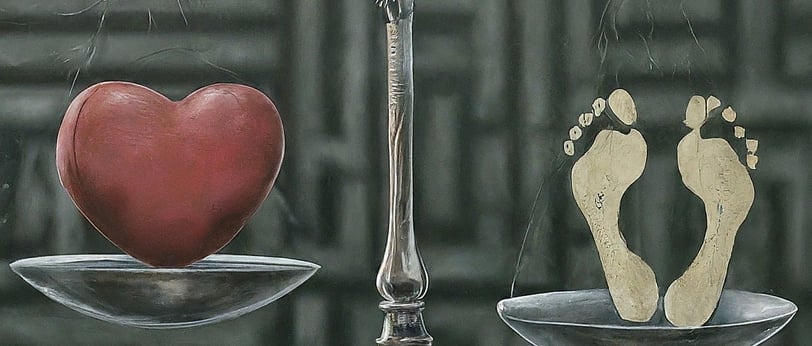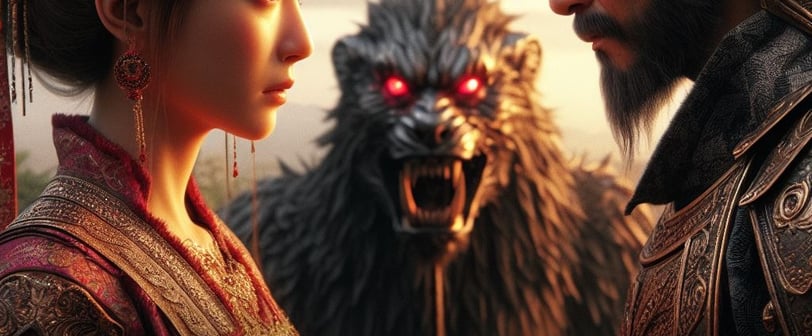Help keep this website stay online by supporting us in ways you can!

Making Difficult Decisions
It's like killing the person who gave birth to you, and what's even worse, you can't reasonably regret it.
BLOG
V. GEORGE
3/3/20243 min read


Decision-making often poses challenges, especially in critical situations where the stakes seem impossibly high. When faced with no favorable choices, making a decision can appear insurmountable. This predicament parallels the gravity of choosing between one's own life and that of the person who gave birth to them. Such scenarios underscore the gravity of tough decisions and the necessity of weighing consequences meticulously.
In this article, we'll delve into the concept of difficult decisions in challenging situations and the complexities they entail. By exploring examples such as an Emperor's daughter confronted with a choice involving her lover, a beast, and an enemy, we'll analyze the significant impacts and intricacies of these decisions.
Defining Difficult Decisions:
Difficult decisions encompass emotionally taxing choices that carry significant consequences. In complex situations, these decisions often arise when all options seem unfavorable. People must select the best available course of action, even if it falls short of being ideal.
One such decision mirrors the extreme act of having to harm the person who brought you into this world. This analogy highlights the exceptional nature of certain circumstances, emphasizing that some choices are excruciatingly challenging, especially when all options yield damaging outcomes. The phrase "you can't even reasonably regret it" emphasizes that in some instances, it's unjust to mourn or feel remorse for an action necessitated by an impossible situation.
Overall, this perspective implies that in certain circumstances, complex judgments might offer no good options. In such cases, blaming oneself for the chosen outcome is unfair, as no better alternatives were available.
An Example of a Difficult Decision:
Consider the story of an Emperor's daughter facing two undesirable options. When the Emperor discovers his daughter's love for a commoner from a despised village, he devises a cruel ultimatum: the commoner must marry either the Emperor's daughter's repulsive enemy or face a lethal beast.
The Dilemma:
On the day of the trial, the Emperor's daughter, torn between conflicting emotions, holds the crucial knowledge of which door conceals the unattractive lady and which hides the ferocious beast. The unappealing lady, pivotal in the daughter's strategy, exposes her secret love for the commoner, as they both vie for the same man and harbor mutual hatred. With tears in her eyes, she signals to her lover which door to choose.
The Difficult Decision:
Her gesture holds immense weight, encapsulating her love for the commoner, her disdain for her rival, and her loyalty to her father's kingdom. The decision bears heavy consequences: signaling the room with the tiger means her lover's demise but eradicates her romantic competition, while signaling the lady's room leads to her lover marrying her enemy, causing her to grapple with jealousy and heartbreak.
The choice of the Emperor's daughter remains open-ended, left to the reader's imagination.
The World Trade Center Tragedy:
The events of September 11, 2001, at the World Trade Center, illustrate the unimaginable dilemmas faced by individuals trapped in the upper floors. Some had to choose between succumbing to flames or jumping to their deaths. The decisions made in those dire moments stand as a testament to the heroism and resilience exhibited in the face of adversity.
Tragically, faced with untenable circumstances, many made the heartbreaking decision to leap from the burning towers—approximately 200 people in estimation. This profound act reflects the desperation and anguish experienced in unimaginably challenging situations. Yet, it also stands as a testament to the heroism, bravery, and resilience exhibited by those confronting the unimaginable.
Navigating Unfavorable Conditions:
Life often presents unfair conditions, testing our resilience and adaptability. In my blog post titled "Fairness is often not a gain but a devotion to a dancing soul," I delve into strategies for navigating such situations.
In conclusion, making tough decisions in challenging situation, proves incredibly difficult. These decisions arise in scenarios devoid of good options, compelling individuals to choose the best course of action, even if it falls short of being ideal. Such choices carry emotional weight and profound consequences. The example of the Emperor's daughter underscores the gravity of tough decisions, emphasizing the need to carefully weigh potential outcomes. When faced with a difficult decision, stepping back, evaluating available options, and making the best choice based on the circumstances becomes essential.









